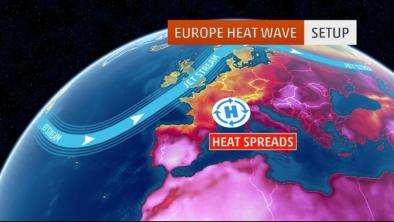Science Source
Understanding the rapid summer warming and changes in temperature extremes since the mid-1990s over Western Europe
- Observations indicate a rapid increase in summer (June–August) mean surface air temperature (SAT) since the mid-1990s over Western Europe
- States that the following accompanied this rapid warming: significant increases in summer mean daily maximum temperature, daily minimum temperature, annual hottest day temperature and warmest night temperature, and an increase in frequency of summer days and tropical nights
- States the diurnal temperature range (DTR) is small
- Focuses on understanding causes of the rapid summer warming and associated temperature extreme changes
- Quantifies the relative roles of changes in sea surface temperature (SST)/sea ice extent (SIE), anthropogenic greenhouse gases (GHGs), and anthropogenic aerosols (AAer)
- Results indicate that the model forced by changes in all forcings reproduces many of the observed changes since the mid-1990s over Western Europe
- Finds that changes in SST/SIE explain 62.2 ± 13.0 % of the area averaged seasonal mean warming signal over Western Europe, with the remaining 37.8 ± 13.6 % of the warming explained by the direct impact of changes in GHGs and AAer
- Results further indicate that the direct impact of the reduction of AAer precursor emissions over Europe, mainly through aerosol-radiation interaction with additional contributions from aerosol-cloud interaction and coupled atmosphere-land surface feedbacks, is a key factor for increases in annual hottest day temperature and in frequency of summer days
- Finds that the reduction of AAer precursor emissions explains 45.5 ± 17.6 % and 40.9 ± 18.4 % of area averaged signals for these temperature extremes
- Finds that the direct impact of the reduction of AAer precursor emissions over Europe acts to increase DTR locally, but the change in DTR is countered by the direct impact of GHGs forcing
- The results suggest that the changes in summer seasonal mean SAT and temperature extremes over Western Europe since the mid-1990s are most likely to be sustained or amplified in the near term, unless other factors intervene
Related Content
Headline

Dec 16, 2016 | The Weather Channel
Heat Records Shattered in Germany, France, The Netherlands in June/July 2015 Europe Heat Wave
Headline

Dec 16, 2016 | Category 6
Germany Breaks its All-Time Heat Record
Headline

Dec 16, 2016 | Washington Post
Germany reaches new all-time hottest temperature during Europe heatwave
Science Source
| Bulletin of the American Meteorological Society
Explaining Extreme Events of 2015 from a Climate Perspective
American Meteorological Society


